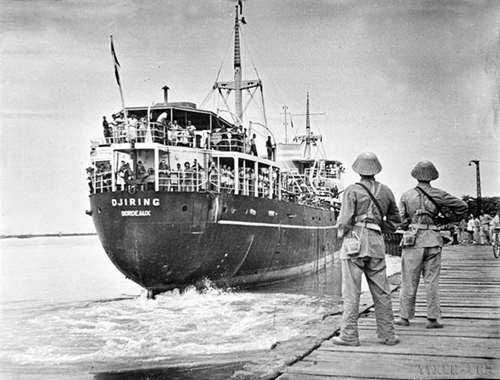Eric Coudray, one of the many French citizens who remain interested in the final battle of the French expeditionary army, has highlighted the historical significance and importance of the agreement to the war in Indochina, stressing that it contributed to ending the nine-year-long war in Indochina.
    |
 |
|
The ship Djiring carrying French troops leave Sau Kho wharf (Hai Phong) to the South on May 13, 1955, in accordance with the Geneva Agreement. The North was completely liberated. |
The defeat of the French troops at the Dien Bien Phu Battle accelerated the signing of the agreement, demonstrating to the French that their war could not be won and that they needed to sit down for negotiations, he added.
The scholar said that this agreement was decisive for the war, compelling nations to recognize the Democratic Republic of Vietnam (now the Socialist Republic of Vietnam) which they had previously denied, and requiring France's expeditionary troops to withdraw completely from Northern Vietnam by May 16, 1955, and to leave Vietnam entirely by 1956.
According to Coudray, although the agreement resulted in the division of Vietnam, the Vietnamese people's struggle was recognized and admired by people around the world, particularly by nations fighting for their independence at that time.
This was also the first time in history that Vietnam's fundamental national rights - independence, sovereignty, unity, and territorial integrity - were affirmed and acknowledged, serving as an important foundation for the Vietnamese people to continue their struggle and ultimately achieve national reunification later on, he said.
Regarding the Geneva Agreement's role in the two resistance wars of Vietnam against French colonialism and American imperialism, Coudray stated that the agreement marked the true beginning of France's decolonisation and boosted the spirit of leaders of the Democratic Republic of Vietnam in their just struggle for independence, and the revolutionary war strategy.
Source: VNA